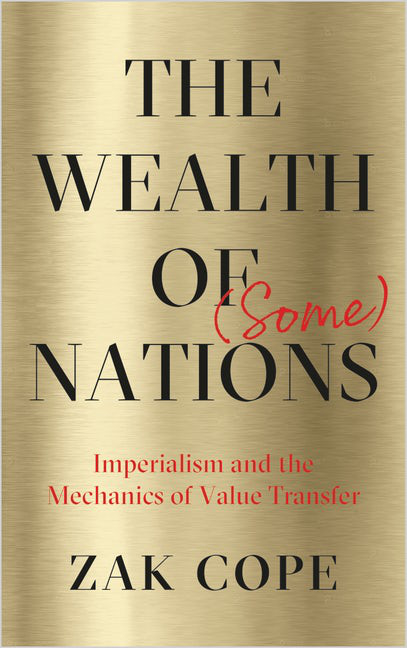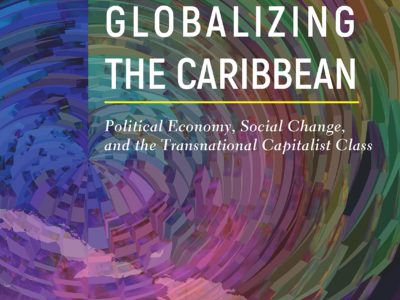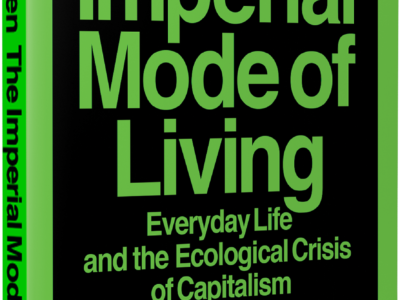Pluto Press, London, 2019, 260 pages.
By Torkil Lauesen1
The title of Zak Cope’s book, “The Wealth of (some) Nations” is a reference to Adam Smith’s book “An Inquiry into the Nature and Causes of The Wealth of Nations” published in 1776. Smith’s book is considered the first comprehensive description of the workings of the capitalist market economy.
Smith argued that by giving everyone freedom to produce and exchange goods as they pleased – free trade – and opening the markets up to domestic and foreign competition, people’s natural self-interest would promote greater prosperity for everyone. He gave the example that a butcher does not supply meat based on good-hearted intentions, but because he profits by selling meat. If the meat he sells is poor, he will not have repeat customers and, thus, no profit. Therefore, it is in the butcher’s interest to sell good meat at a price that customers are willing to pay, so that both parties benefit in every transaction. The ‘invisible hand’ of all these individual transactions would keep the market in balance and everyone happy. According to Smith, the government should stay out of the economy; any interference would merely destroy the balance of the market. Government responsibilities should be limited to the defense of the nation, universal education, building infrastructure such as roads and bridges, the enforcement of rights and contracts, and the punishment of crime. If so, then all nations may become wealthy.
Well, it did not work out that way. Neoliberals, however, still argue that poverty and inequality are the result of government interference. Zak Cope has another explanation. The capitalist market forces polarize people into rich and poor, and the unbalanced market of capitalism creates imperialism, that is, value transfer making some nations wealthy and others poor. This difference in national wealth is also reflected in the standard of living of the working class. The imperialist value transfer does not only benefit capital in the rich nations, in the form of profit, but it is also a benefit for the consumers of the goods produced in the poor countries by low wage workers. The relatively cheap prices of smartphones and other electronics, cars, refrigerators and washing machines, shoes, clothes, furniture, toys, bananas, coffee, tea, spices, chocolates, you name it, creates the wealth of some nations.
“The Wealth of (some) nations” builds on Cope´s book, “Divided World, Divided class” from 2012 (second edition, 2015). However, in this new book he focuses on the mechanics of imperialism: colonial tribute, monopoly rent, and unequal exchange. The mechanics of imperialism is presented in a very systematically and concentrated form, supported by a wealth of empirical facts. There is no chitchat. It is not an easy read, and you have to take time to digest the book’s contents, but after you read it, you feel satiated; there is no empty calories here.
In the introduction (Page 2) Cope writes: “The Wealth of (Some) Nations examines a subject that is virtually taboo on the left, namely, the connection between imperialism and the massive disparity in living standards between workers in the First World and workers in the Third World.”
However, this taboo is of recent provenance. Marx and Engels did not pull any punches in their description of the connection between colonialism and national chauvinism, racism and reformism in the English working class.2 And Lenin portrayed, without blemish, the connection between imperialism and the same tendencies in the European working class, in the years leading up to World War I.3
Since then, however it has been a taboo or simply repressed view that the working class in Western Europe and North America, having a relatively high wage level, benefits from imperialism. This situation, of course, also has political consequences. We may criticize the bourgeois parties, the right populists and social democracy. However, these parties have political power granted to them by their voters, and the fact that the working class, among others, votes for them. Voters have interests, and the political parties take care of these interests. Voters are not “innocent sheep” who are misled or manipulated into a “false consciousness”. I do not deny that manipulation occurs, but to explain the working class’s support for reformism – and what is worse – for decades, if not a century, as a manifestation of “false consciousness” is to leave the science of historical materialism.
Zak Cope offers many examples as to how the First World working class benefits from capitalism. Let me just add one example from my part of the world, Scandinavia. Sweden is the country in the world with the most shareholders, compared to the size of the population. Many companies offer their employees the opportunity to buy shares on favourable terms. Mats Lindqvist writes in his book “Ice in the Stomach”, that already in 1988 more than 200.000 employees in 200 companies had shares of a value over 13 billion Swedish kroner4 .The total population in Sweden is 10 million. Approximately 1.3 million Swedes owns shares directly, up to 5.5 million own shares through private funds, and 7.5 million own shares through their pension savings.5 Two thirds of Sweden’s 10 million people are shareowners. I am well aware that share capital is not evenly distributed, and these people are small shareholders, but nevertheless it gives them a supplement to their wage and a secure retirement. They have, so to speak shares in capitalism, and thus an interest in its well-being.
In the presentation on the blurb of the book, the publisher calls the book “a provocative new study” and that Cope makes the “controversial claim… that the workers in the rich countries benefit from higher income and welfare systems with public health, education, pension and social security”. Frankly, I do not think the facts Cope present are controversial. It is plain to see if you just lift your eye and take a look at the difference of living condition in the world today.
The reason to insist on breaking this taboo is not to provoke but, rather, the pressing need to face the harsh realities if we are to develop a realistic and effective anti-capitalist strategy. Marx, Engels and Lenin did it, because an assessment of class interests is crucial for choosing the right alliance partners in the fight for another world order. It is the same today.
Zak Cope´s (and my own studies) have to a large extent, been concerned with the relation between imperialism and the revolutionary potential of the working classes in a divided world. The question is: Who has, so to speak, an “objective economic interest” in radical change.
In our part of the world, being an anti-imperialist, is an identity you can choose or leave, as it fits in your life situation. In the global South, this choice is much more embedded in a material background, in the work situation and in the everyday political framework. Being an anti-imperialist is closely linked to the individual and collective struggle against exploitation and oppression.
However, “material interest” and “will” to radical change is far from the only requirement for a revolutionary situation to arise. There is no 1: 1 relationship between “objective economic interests” of the working class and revolutionary action. In the late sixties and early seventies, millions fought for socialism in the global South. Today, this is not the case. Many factors play a role in the rise of a revolutionary situation. First of all, there are contradictions in capitalism itself. As Marx writes: “No social order is ever destroyed before all the productive forces for which it is sufficient have been developed.”6 With the economic, political and ecological crises of capitalism, we are rapidly approaching that point. But there are other factors such as culture, the ability to organize and so on, which play a role in the struggle, for a positive outcome, of the collapse of capitalism.
We need to know much more about how these factors interact with the economic interest to develop our strategies for revolutionary struggle.
However, as a conclusion of Zak Cope´s book, one thing is for sure: the struggle for socialism must have a global perspective and anti-imperialism must be a central and integral part of the struggle, not just as a supplement. If we do not have a clear anti-imperialist perspective, if instead we in the global North simply struggle for our share of national prosperity, without worrying about where it originated, then the road is open to national-chauvinism. You cannot promote socialism at home and support imperialism abroad. Socialism is indivisible. One cannot be an anti-capitalist without being an anti-imperialist.
For your information, I am biased to write this review, as I am a friend of Cope and share his views. ↩
See Lauesen Torkil, Cope, Zak (2016): Introduction to: “Marx and Engels on Colonialism, Industrial Monopoly and the Labor Movement”. Kersplebedeb. Montreal 2016. ↩
See Lauesen, Torkil, Cope, Zak (2019): Introduction to, Lenin on Imperialism and opportunism. Kersplebedeb. Montreal 2019. ↩
Lindqvist, Mats (2001), Is I magen. Om ekonomiens kolonisering av vardagen, page 42. Natur och Kultur. Stockholm 2001. ↩
https://www.aktiespararna.se/om-aktiespararna/var-organisation/historia ↩
Marx, Karl (1859) Preface of, A Contribution to the Critique of Political Economy. https://www.marxists.org/archive/marx/works/1859/critique-pol-economy/preface-abs.htm ↩




